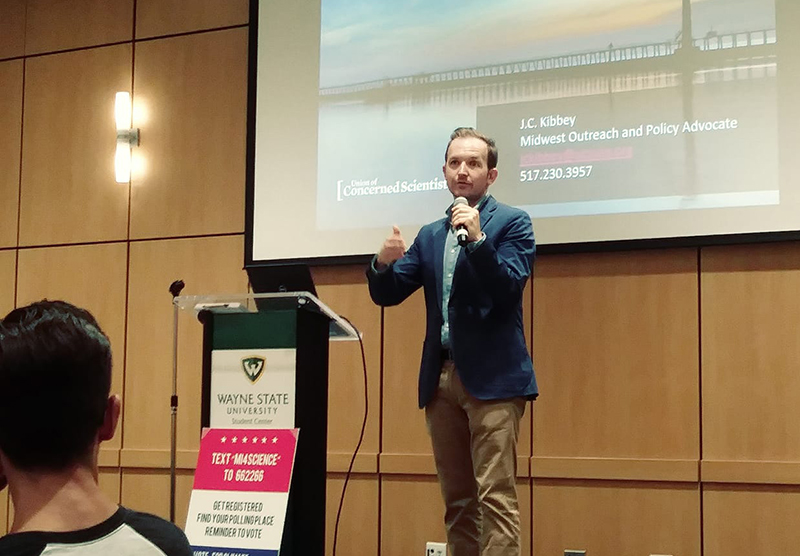Michigan Environmental Justice Coalition seeks to change the narrative, make urban and rural connections at September Statewide Summit in Flint
Words by Nina Ignaczak
Mine waste in the Upper Peninsula’s Lake Superior. Fracked gas in Detroit coming from Ohio. Lead contamination in Flint’s drinking water. PFAS contamination in Kalamazoo’s drinking water. Skyrocketing energy bills and water shutoffs in Detroit. The ongoing threat of an oil spill from an aging pipeline in the Straits of Mackinac. Pet coke storage on the Detroit River.
Across Michigan, communities, often disproportionately low-income people of color, are facing environmental threats to their health. Taken individually, these challenges can seem isolated. But looked at in aggregate, a different picture emerges – one of a state at a crossroads.
“We have a real recognition right now that all of the different issues happening all over the state of Michigan are incredibly difficult for our government to acknowledge, or to make the kinds of changes that are needed to protect the health of Michigan residents,” says Michelle Martinez, statewide coordinator for the Michigan Environmental Justice Coalition. “And our ecological systems are at a critical point, so the stakes are really high for our future. We must start making connections between the different struggles that are left isolated in very remote, rural areas or just brushed off as ‘Oh, that’s a Detroit issue, right?'”
Making those connections is the aim of the upcoming Statewide Summit, to be held September 8, 2018, from 8am-5pm at the McCree Theatre in Flint. The conference, which has been held every two years since 2014, will feature experts and workshops addressing four tracks: Energy Justice, Water Justice, Racial Justice, and Youth Leadership.
The theme of the conference, “Change the Narrative,” is designed to challenge the media trope that paints disadvantaged communities as unwitting victims of environmental catastrophes. Instead, says Martinez, the goal is to share stories of resistance.
“We’re asking people to come and lift their stories up, and tell us the truth about what’s happening in their communities,” says Martinez. “We’re working to change the narrative, to let the world know that we are here and we are actually working for social change.”

We spoke with Martinez to find out more about what they hope to accomplish with this year’s conference.
AMP: How did the Statewide Summit get started?
Martinez: In 2014, the Environmental Justice Coalition hosted our first convening in Lansing, Michigan over two days, inviting leaders in the environmental justice (EJ) movement to discuss the history of the EJ movement in Michigan and to look at some of the issues.
At this time we knew that there was reluctance from Governor Snyder to advance any major policy that would help impact environmental justice, but people were unaware of major crises to come, like the Flint water crisis. We were hopeful at that time that we still might be able to impact change at the state level, but we really needed to start building the network from the movements across the state of Michigan.
AMP: Who attends the Statewide Summit?
Martinez: We have 250 participants from all over the state of Michigan. We have folks on the front-line of different environmental justice issues, from the Upper Peninsula to Detroit, even folks coming in from Ohio.
AMP: The keynote lunch speakers for this year’s conference include Jannan J. Cornstalk of the Little Traverse band of Chippewa Indians and Desmond Berry of the Grand Traverse Bay of Ottawa and Chippewa Indians. They are leading tribal protests against the Enbridge Line 5 oil pipeline in the Straits of Mackinac. Why did you decide to lead the conference with them?
Martinez: The McCree Theater, where we are hosting the event, has been victimized by the Flint water crisis, and we’ve been in a position to have to ask people to carry water. Folks in Flint and Kalamazoo don’t have access to clean water, and the threat of an oil spill in the Great Lakes would have widespread repercussions for thousands of years, not only for our ecology but for our ability to drink fresh, safe water in our homes. This issue is emblematic of the crisis facing Michigan right now, and what our communities are facing collectively.
AMP: Tell us more about the conference theme ‘Change the Narrative’. What narratives are you trying to change?
Martinez: Currently what we see a lot when the media covers our issues is, ‘Oh, these poor people of Detroit and these poor people of Flint’ or, ‘This is terrible. What a tragedy about a town with an oil spill’. Oftentimes, this is painting the people who are subjected to environmental injustice as victims, while the contrary is very true: the folks who are on the ground, advocating and organizing, are really the heroes of the story.
They’re making connections between their health and contamination. They’re gathering data to examine the extent of the impact. They’re making social networks to support each other through crises. They’re advocating their lawmakers. They’re putting new people in the office. All kinds of successful and amazing social changes are happening that just aren’t cited in the media.
AMP: How has MEJC led the planning of this conference, and which groups have participated?
The planning process has been a collective process of 16 volunteer organizations to help develop the tracks, choose the sessions, and develop the narrative. It was a process of collective design, very much in line with EJ principles of collective decision making, and it’s been awesome process.
Representatives have included the following individuals and organizations:
- Soulardarity
- Kettering University
- Wayne State University- Center for Urban Responses to Environmental Stressors
- Native Justice Coalition
- Dolores Leonard
- Climate Justice Alliance
- Friends for Environmental Justice
- University of Michigan Dearborn
- We the People Detroit
- Great Lakes Environmental Law Center,
- We Found Hip Hop
- Reverend Joan C. Ross, NEWCC
- Sierra Club

AMP: You’re working to bring connection to people living in very different environments in Michigan. What do people from the Upper Peninsula have to learn from people in Detroit, and vice versa?
Martinez: We’re really trying to reach out to folks in the Upper Peninsula, that has the highest energy rate in the United States after Hawaii, and we’ve done that to sort of say, ‘Well, while Detroit is suffering from energy shut-offs some 200,000 times a year, what are your issues around energy poverty that we’re not paying attention to yet that could be brought into the forefront?’
So these kinds of connections between really remote, rural and urban… It’s the same fight. The fight for human dignity, the fight to have water in your home, to have heat in the winter, to be able to breathe and able to drink. Those are the things that people are talking about which are very crucial to survival.
On September 8, Michigan Environmental Justice Coalition will host its 3rd Environmental Justice Statewide Summit, convening Environmental Justice (EJ) activists to testify, visualize, and strategize for a just and equitable future. All are welcome, including frontline communities, neighborhood groups, campaigns and coalitions, students and teachers, mamas with babies, and elders. Register to attend panels, info sessions, teach-ins, dialogue and talking circles, skillshares, and more at the 2018 Michigan Environmental Justice Statewide Summit.
The Michigan Environmental Justice Coalition is a Sponsored Project of Allied Media Projects. Learn more about MEJC and how to support their work here.